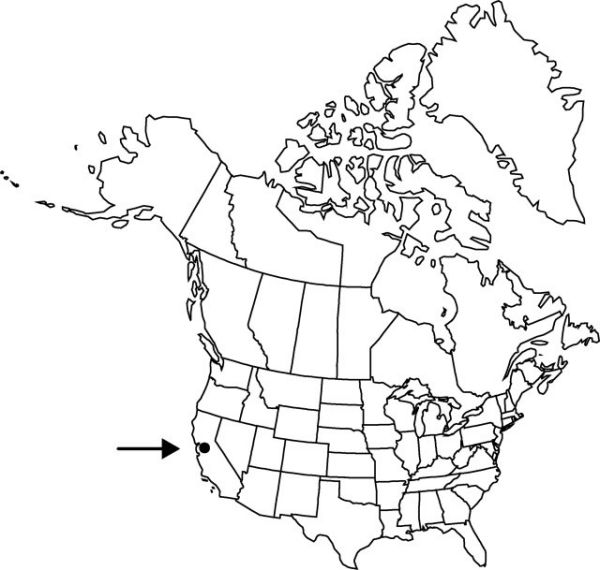Difference between revisions of "Allium sharsmithiae"
Aliso 13: 417. 1992.
FNA>Volume Importer |
imported>Volume Importer |
||
| (6 intermediate revisions by 2 users not shown) | |||
| Line 7: | Line 7: | ||
|year=1992 | |year=1992 | ||
}} | }} | ||
| − | |basionyms={{Treatment/ID/ | + | |special_status={{Treatment/ID/Special_status |
| + | |code=E | ||
| + | |label=Endemic | ||
| + | }}{{Treatment/ID/Special_status | ||
| + | |code=C | ||
| + | |label=Conservation concern | ||
| + | }} | ||
| + | |basionyms={{Treatment/ID/Basionym | ||
|name=Allium fimbriatum var. sharsmithiae | |name=Allium fimbriatum var. sharsmithiae | ||
|authority=Ownbey & Aase ex Traub | |authority=Ownbey & Aase ex Traub | ||
| + | |rank=variety | ||
| + | |publication_title=Pl. Life | ||
| + | |publication_place=28: 64. 1972 (as sharsmithae) | ||
}} | }} | ||
|synonyms= | |synonyms= | ||
| Line 27: | Line 37: | ||
|distribution=Calif. | |distribution=Calif. | ||
|discussion=<p>Of conservation concern.</p><!-- | |discussion=<p>Of conservation concern.</p><!-- | ||
| − | --><p>Allium sharsmithiae is known only from the Mount Hamilton Range.</p> | + | --><p><i>Allium sharsmithiae</i> is known only from the Mount Hamilton Range.</p> |
|tables= | |tables= | ||
|references= | |references= | ||
| Line 36: | Line 46: | ||
-->{{#Taxon: | -->{{#Taxon: | ||
name=Allium sharsmithiae | name=Allium sharsmithiae | ||
| − | |||
|authority=(Ownbey & Aase ex Traub) McNeal | |authority=(Ownbey & Aase ex Traub) McNeal | ||
|rank=species | |rank=species | ||
| Line 50: | Line 59: | ||
|publication title=Aliso | |publication title=Aliso | ||
|publication year=1992 | |publication year=1992 | ||
| − | |special status= | + | |special status=Endemic;Conservation concern |
| − | |source xml=https:// | + | |source xml=https://bitbucket.org/aafc-mbb/fna-data-curation/src/2e0870ddd59836b60bcf96646a41e87ea5a5943a/coarse_grained_fna_xml/V26/V26_455.xml |
|genus=Allium | |genus=Allium | ||
|species=Allium sharsmithiae | |species=Allium sharsmithiae | ||
Latest revision as of 21:15, 5 November 2020
Bulbs usually solitary, not clustered on stout, primary rhizome, ovoid to globose, 1–1.8 × 1–1.5 cm; outer coats enclosing bulb, reddish brown, membranous, lacking cellular reticulation or cells arranged in only 2–3 rows distal to roots, ± quadrate, without fibers; inner coats pale brown, cells obscure, quadrate. Leaves persistent, withering from tip by anthesis, 1, basally sheathing, sheath not extending much above soil surface; blade solid, terete, 15–25 cm × 1–4 mm. Scape persistent, solitary, erect, solid, terete, 4–17 cm × 1–2.5 mm. Umbel persistent, erect, compact, 5–50-flowered, hemispheric, bulbils unknown; spathe bracts persistent, 2–3, 3–8-veined, lanceolate to lance-ovate, ± equal, apex long-acuminate to setaceous. Flowers urceolate, 10–18 mm; tepals erect, deep reddish purple, linear-lanceolate to lance-ovate, ± equal, becoming rigid in fruit, margins entire, apex acute to obtuse, recurved-spreading at tips; stamens included; anthers yellow; pollen yellow; ovary crested; processes 6, prominent, ± triangular, margins entire, surfaces usually papillate; style linear, equaling stamens; stigma capitate, 3-lobed, lobes slender, recurved; pedicel 6–19 mm. Seed coat dull or shining; cells minutely roughened. 2n = 14.
Phenology: Flowering Apr–May.
Habitat: Serpentine clay soil on talus slopes
Elevation: 500–1100 m
Discussion
Of conservation concern.
Allium sharsmithiae is known only from the Mount Hamilton Range.
Selected References
None.
